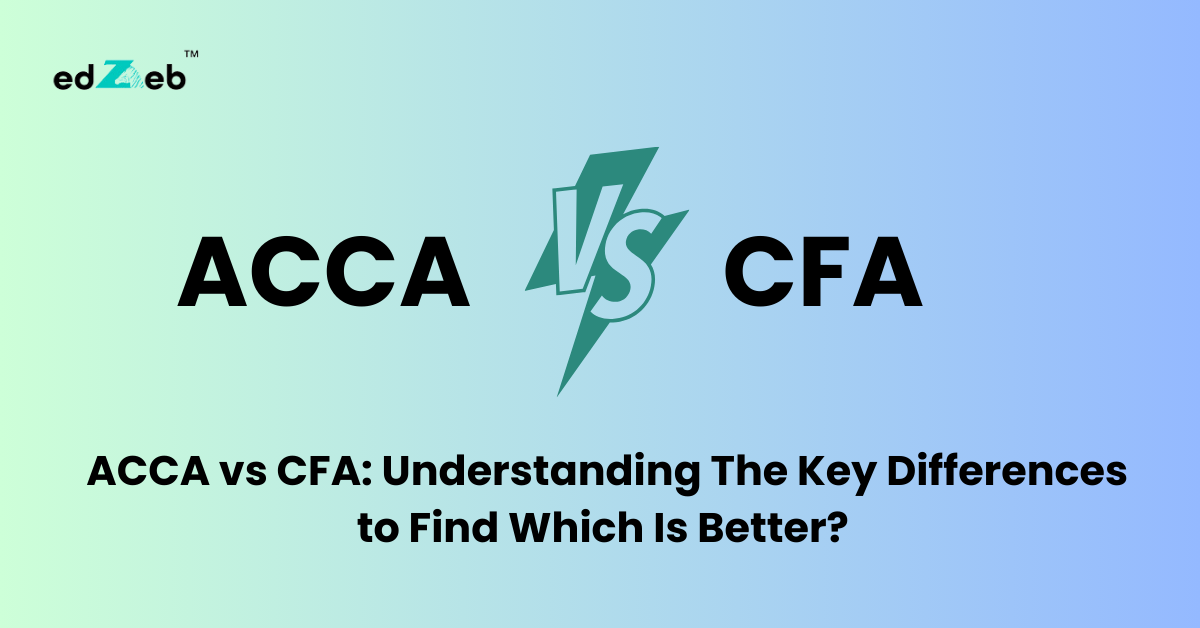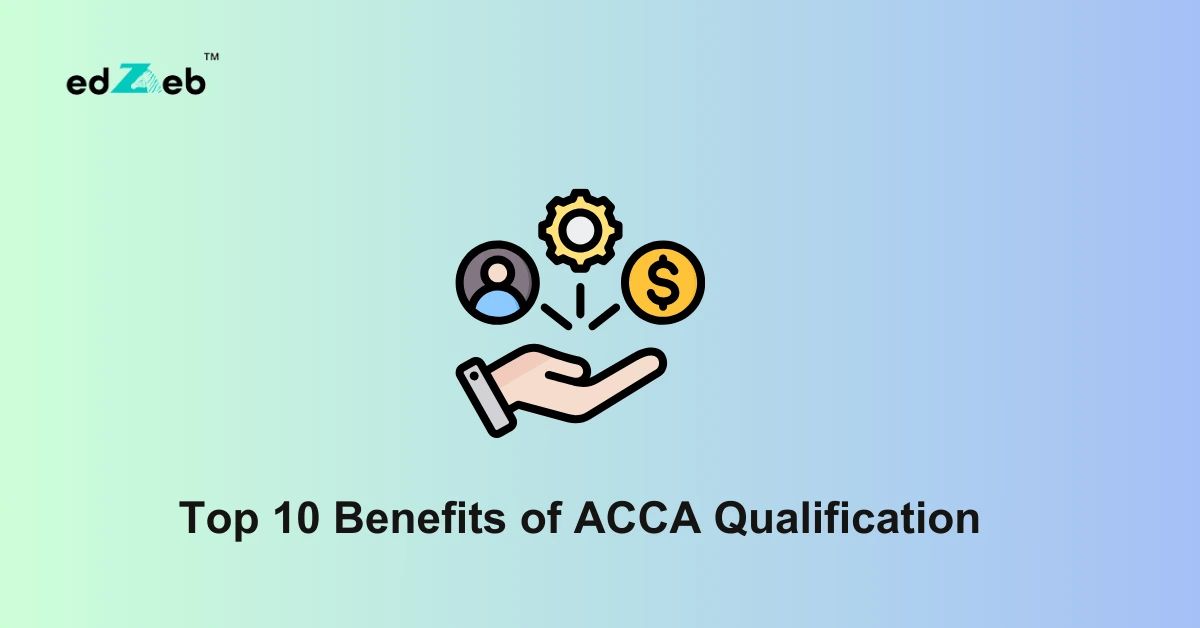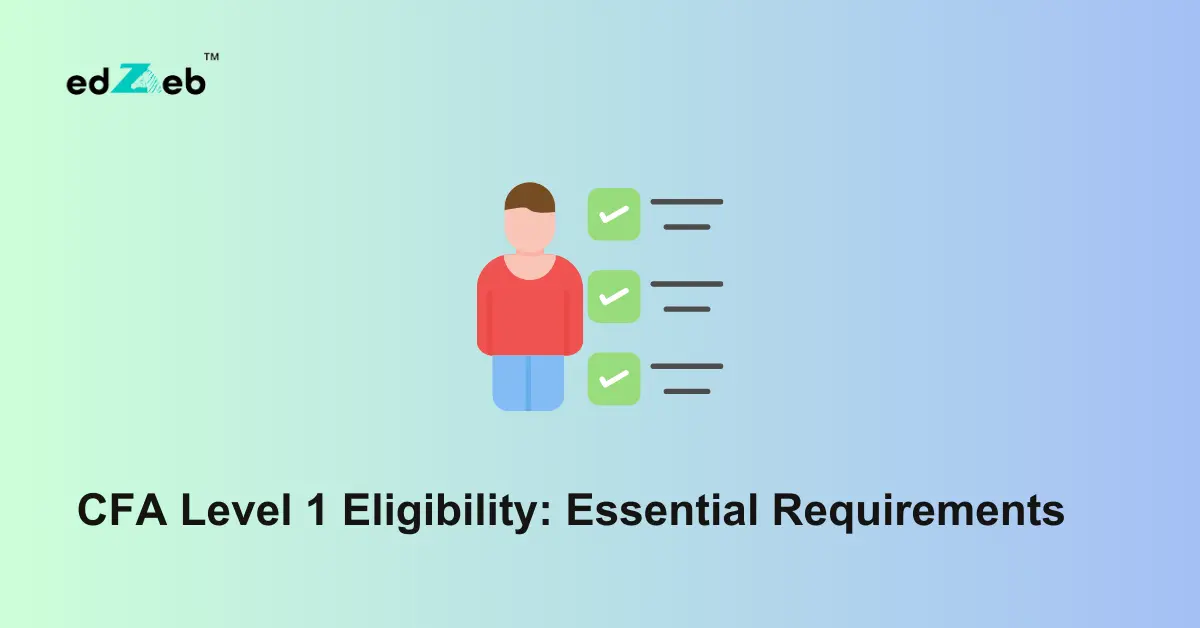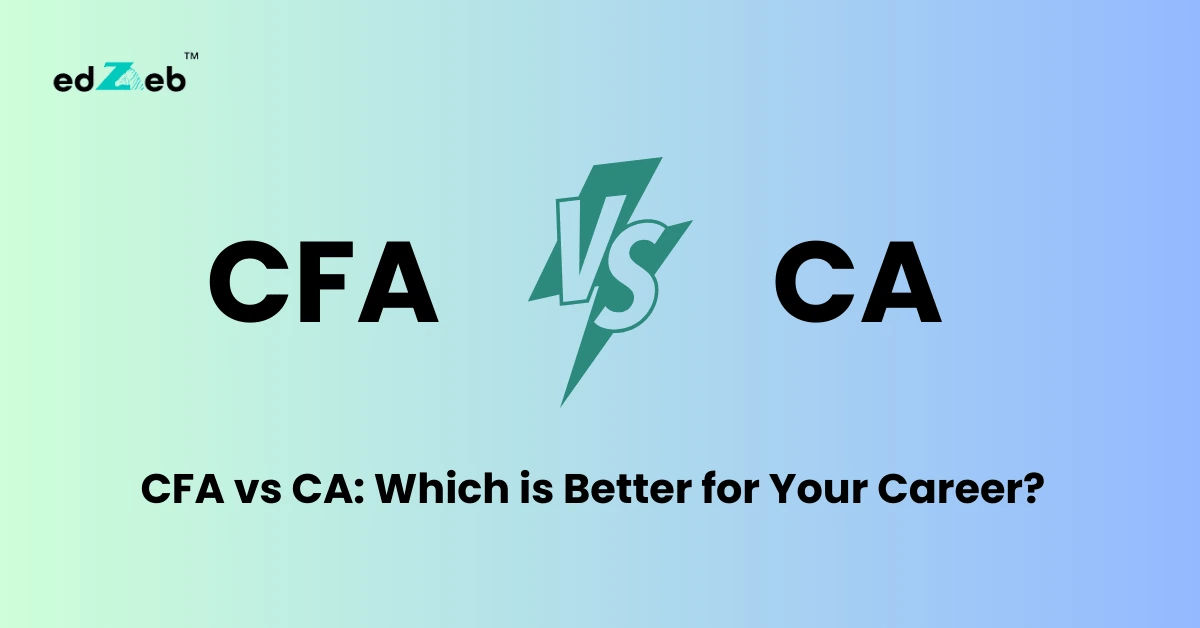
In a highly competitive finance and accounting industry, many aspiring professionals are finding it hard to choose a certification because it can impact their whole career trajectory. So, choosing between ACCA vs CFA certifications is crucial. Still, before that, you must be aware that both of them are globally recognized and help you learn financial expertise catering to distinct professions.
This blog aims to help you make an informed decision between ACCA vs CFA elaborating on understanding their key differences.
Table of Contents:
Understanding ACCA vs CFA
Understanding ACCA vs CFA is important as it determines the skill set of aspiring finance professionals and will help them align with their career goals and industry demands.
So this blog aims to clarify the difference between CFA and ACCA Certification. Whether you want to specialize in accounting or investment management, this comparison will help you make an informed decision about which qualification out of both ACCA and CFA best suits your ambitions.
What is ACCA and What it Covers
The Association of Chartered Certified Accountants (ACCA) is a professional certification covering a broad range of subjects necessary for finance professionals.
It can be done by anyone who seeks to build a career in the finance and accounting industry worldwide. Even a metric pass student is eligible for doing an ACCA course and those interested in pursuing this qualification can benefit from ACCA Coaching in Delhi.
Levels and Paper Patterns:
- Knowledge Level (KL): Multiple Choice Questions (MCQs) focused on foundational knowledge.
- Skills Level (SL): Combination of MCQs and subjective exams, emphasizing practical application.
- Professional Level (PL): Subjective exams testing advanced knowledge and skills across strategic areas.
Therefore, ACCA is a comprehensive qualification that combines academic training with practical experience and provides exemptions so that candidates do not waste time and effort studying repeated subjects. The certification prepares graduates for successful careers in accounting, finance, and business management on a global scale.
What is CFA and What it Covers
Chartered Financial Analysis (CFA) qualification is administered by the CFA Institute. It equips candidates with in-depth knowledge and practical skills in investment management and financial analysis.
CFA certification can be possessed by candidates who want to make it to MNCs including the Big 4s. The graduates who have completed a bachelor’s program or 2nd-year students can appear for CFA level I, and are eligible to start their CFA coaching in Delhi, India.
Levels and Paper Patterns:
- CFA Level 1: Multiple Choice Questions (MCQs) covering foundational knowledge across key topics.
- CFA Level II: Item Set Questions (vignettes) requiring application of knowledge to real-world scenarios.
- CFA Level III: Structured response (essay) and item set questions focusing on portfolio management and client relationships.
Therefore, the CFA program tests progressively deeper knowledge and practical application in investment management and financial analysis. It is considered the “gold standard” in the Finance sector.
Breaking Down the ACCA and CFA Difference
Both ACCA and CFA are prestigious certifications that can open doors to exciting careers in finance. Here’s a quick breakdown of each in the table below.
ACCA vs CFA | ||
|---|---|---|
Features | ACCA | CFA |
Focus | Audit & Assurance, Taxation, Financial Management, Financial Reporting, Performance Management, Strategy | CFA certification broadly focuses on investments |
Career Path | Accounting, audit, finance | Investment and equity research |
Professional Experience | Required for membership | Required for charter |
Career Prospects | Promising | Lucrative |
Recognition | Globally recognized | Globally recognized |
Exam Pass Rate in India | Variable | Low (typically around 30-40%) |
So, from this ACCA vs CFA table, it can be said that ACCA Course is ideal for those who want a well-rounded finance background and a career in accounting, auditing, or corporate finance whereas the CFA course is for individuals who want to know about investments and looking for job roles in investment banking, portfolio management, or equity research. Apart from these key differences, the CFA salary vs ACCA salary packages can also play a crucial role in informed decision-making. Read further and explore many other differentiating factors.
Difficulty Level
It is crucial to comprehend the format and degree of difficulty of each qualification exam in order to adequately prepare yourself for the path ahead.
ACCA covers finance, accounting, and business topics at a manageable depth, while the challenge lies in the breadth. The exam’s difficulty increases progressively, with early exams being straightforward and later, Strategic Professional exams being more complex, and the ACCA pass rates generally indicate moderate difficulty.
However, the CFA program focuses on investment analysis, portfolio management, and finance, offering a dense yet challenging material. Its depth of understanding, particularly in Level II and Level III, is significant. The exam format, including vignettes, multiple-choice, and essay-type questions, requires time pressure and understanding. CFA pass rates are comparatively lower than ACCA exams.
Time Duration
The ACCA course can be completed in less than 3 years depending on the exemptions provided but CFA takes 3 years due to its rigid course structure.
ACCA vs CFA Salary
Understanding the salary potential of ACCA and CFA professionals in India is crucial for those considering a career in finance.
ACCA Salary in India
ACCA salary propositions range from ₹3,00,000 to ₹6,00,000 annually in entry-level positions like junior accountants or financial analysts. With experience, salaries increase from ₹6,00,000 to ₹12,00,000 per year for senior accountants or audit managers. Senior-level positions can earn upwards of ₹12,00,000, with potential for more.
CFA Salary in India
CFA salary expectations range from ₹4,00,000 to ₹8,00,000 annually, depending on their entry-level roles. Mid-career positions like portfolio managers or research analysts can offer salaries between ₹8,00,000 and ₹15,00,000. Senior-level positions like chief investment officers or fund managers can potentially pay up to ₹25,00,000 or higher.
ACCA vs CFA Fees
The ACCA qualification requires a one-time registration fee of ₹8,400, followed by an annual subscription of ₹11,400. Exam fees vary across levels, with Applied Knowledge at ₹9,200, Applied Skills at ₹13,700, and Strategic Professional at ₹17,400 and ₹24,200. Moreover, the Ethics and Professional Skills Module costs ₹7,600 and the exemption fees depend on prior qualifications. So, the minimum total cost is around ₹2,30,000.
The CFA certification program involves a one-time enrollment fee of 29,373 INR ($350) for the first Level I exam, followed by a tiered exam registration fee of around 75,531 INR ($900) for early registration and 1,00,709 INR ($1,200) for standard registration. The curriculum cost includes eBooks and printed materials, with additional costs ranging from 4,196 INR ($50) to over 83,924 INR ($1,000). The total cost of pursuing the certification is around 25,1857 INR ($3,000).
Eligibility Criteria
Understanding ACCA and CFA eligibility criteria is crucial for candidates to prepare for their respective programs, as each program has specific requirements.
ACCA qualification requires candidates to be 18 or older to register independently. For 10+2 students, a minimum of five subjects including English and Mathematics/Accounts, with a minimum of 65% in two subjects and over 50% in others, is required but no ACCA exemptions. However, graduates from accredited institutions may receive exemptions from some exams.
The CFA exam requires candidates to have a bachelor’s degree or be in the final or pre-final year of their program. Candidates without a degree can have 4,000 hours of full-time professional work experience, excluding internships, part-time jobs, or student teaching. A combination of education and work experience of at least four years is also eligible. A valid international travel passport is required for registration and exams, ensuring global identity verification. A strong command of English is beneficial as the CFA curriculum and exams are exclusively offered in English.
Scope of ACCA vs CFA
ACCA covers a broad range of topics including accounting, law, finance, business, audit, and taxation but CFA provides narrow specialization on ethical professional standards, quantitative methods, economics, equity investments, and planning. Therefore, ACCA affiliation has a broader scope compared to specialized CFA certification.
Which is Better CFA or ACCA?
Until now, we have discussed the key difference between CFA and ACCA and their other key aspects that will help you decide which is better CFA or ACCA. So, there is no single “better” option – the ideal choice depends on your career aspirations and personal strengths. Apart from the difference between certifications, it is also important to consider certain other key aspects mentioned below, so let us go through them and find who wins the battle between ACCA vs CFA which is better for you?
Strength
It is better to consider your strong points before you begin coaching. Our expert career counselors at edZeb will help you identify your strengths that align with a CFA or ACCA certification.
Course Flexibility
Also, it is crucial to identify the course of study and which certification provides you with flexibility as ACCA offers more flexibility with self-study options. Candidates can choose to study full-time or part-time. This flexibility effectively maintains their work and study commitments balance. While CFA is comparatively rigid consuming 3-4 years of time and effort.
Annual Package
There is a noticeable difference in the CFA salary vs ACCA salary. An ACCA senior earns approximately 20 Lacs per annum on average and its counterpart is around 35 Lacs. The annual compensation package is a prominent differentiating factor.
Curriculum
Before enrolling, one must observe the curriculum in depth to get an idea of what suits them best and the key subjects to be learned.
Mode of Learning
If you are ready to learn online then it is not a considerable factor but yes, if you only want to join offline live classes then you must check the course availability in your vicinity. Moreover, edZeb offers flexible modes of learning, offline/online or pre-recorded lessons.
Therefore, it is suggested to consider the above-mentioned key factors before deciding to start your preparation from edZeb, the best accounting and finance institute in Delhi, India.
Conclusion
Picking one out of ACCA and CFA should be an informed decision and this is our primary reason to write a blog, aiming to be your ultimate guide on selecting ACCA or CFA. ACCA makes you a versatile candidate for various roles. However, CFA is a specialized deep dive into investments and portfolio management. Therefore, consider your strengths, preferred learning style, and desired level of flexibility when making your choice. Remember, there’s no single “better” option; the ideal path aligns with your passions and professional aspirations.
FAQs
ACCA vs CFA Which is Better?
Many are in favor of the Association of Chartered Certified Accountants due to ACCA paper exemptions, and its examination pattern. On the other hand, CFA takes 3 to 4 years to complete which is more than ACCA. So in the battle of ACCA vs CFA which is better, ACCA is generally favored by many.
Who Earns More CA, CFA, or ACCA?
All these are certifications, CAs are restricted to the geographical boundaries of their country but ACCA vs CFA salary, both are globally recognized certifications and CFA is considered to be a more specialized study than ACCA. So out of all CFA has the upper hand. Otherwise, a smart individual possessing any certification would make a lot of money out of his skills and experience.
Can a 12th pass apply for ACCA?
ACCA eligibility criteria allow a 12th pass to enroll in ACCA but without any exemptions, the candidate must pass all 13 ACCA exams to get the esteemed certification.
How many years is ACCA after graduation?
Enrolling in ACCA after graduation makes you eligible to receive ACCA paper exemptions. So, the duration of completing your ACCA after graduation varies but it hardly takes more than 2 years and the rest depends upon the individual circumstances.









